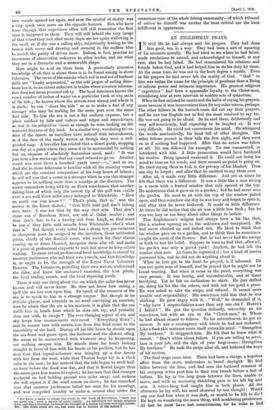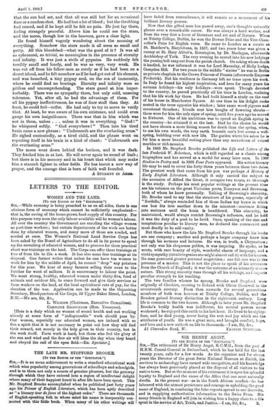AN ENGLISHMAN PRAYS.
IN civil life he had always said his prayers. They had done him good, too, in a way. They had been a sort of squaring of his accounts morally. He had tried to see where be had failed, made resolutions to amend, and acknowledged to himself, at any rate, that he had failed. He had remembered his relations and friends before God, and it had helped him to do his duty by them. At the same time, he was not in the least degree a mystic. Even in his prayers he had never felt the reality of God. " God " to him was rather the name for the principle of goodness than a Being of infinite power and intimate importance. His greatest religious " experience " had been a spasmodic loyalty to the Christ-man, stimulating him at rare intervals to sudden acts of quixotism.
When he first enlisted he continued the habit of saying his prayers, more because it was inconvenient than for any other reason, perhaps. The other fellows in the barrack-room did not say their prayers, and he was too English not to feel the more resolved to say his. He was not going to be afraid. So he said them, deliberately and very self-consciously, half expecting to be laughed at. It was very difficult. He could not concentrate his mind. He whispered the words mechanically, his head full of other thoughts. The other fellows paused in their talk the first night, and then went on as if nothing had happened. After that no notice was taken at all. No one followed his example. No one commented, or interfered with him. A little persecution would have hardened his resolve. Being ignored weakened it. Ho could not bring his mind to bear on his words, and there seemed no point in going on. He tried saying them in bed, in the privacy of his blanket. Then one day he forgot ; and after that he omitted to say them ever.
After all, it made very little difference. And yet at times he felt that there was a difference. It was a little like a man sitting in a room with a frosted window that only opened at the top. He understood that it gave on to a garden ; but he had never seen the garden. He used to sit with the top of the window pulled open, and then somehow one day he was busy and forgot to open it, and after that he never bothered. It made so little difference. At times he did notice that the air was a little less fresh ; but he was too lazy or too busy about other things to bother.
This Englishman's religion had always been a bit like that, like a window opening on to the unknown and unexplored. He had never climbed up and looked out. He liked to think that his window gave on to a garden, and to think that he sometimes caught the scent of the flowers. But he had never had the energy or faith to test his belief. Suppose he were to find that, after all, his garden was only a paved yard ! Anyhow, he had left the window shut now. At times he regretted it ; but a kind of inertia possessed him, and he did not do anything about it.
When he first got to the front he prayed, lisif ashamed. He was not quite sure of himself, and he prayed that he might not be found wanting. But when it came to the point, everything was very prosaic. It was boring, and uncomfortable, and at times terrifying. Yet he felt no inclination to shirk. He just drifted on, doing his bit like the others, and with not too good a grace. He was asked to take the stripe, and refused. - It meant more trouble and responsibility. His conscience told him that he was shirking. He grew angry with it. "Well," he demanded of it, "why have I responsibilities more than any one else Haven't I failed I" He put the question defiantly, ostensibly to his conscience, but with an eye to the "Christ-man," in Whom he had almost ceased to believe. To his astonishment, he got an answer. It was a contingency with which he had not reckoned. Like a flash this sentence wrote itself across his mind : "Strengthen My brethren." It staggered him. He felt that he knew what it meant. "Don't whine about failure. If you are willing to serve, here is your job, and the sign of your forgiveness : Strengthen My brethren." He took the stripe after all, and fathered the boys of his section.
The final stage came later. There had been a charge, a hopeless affair from the start, undertaken in broad daylight. He had fallen between the lines, and had seen the battered remnant of his company retire past him to their own trench before a hail of bullets. He lay in the long grass between the lines, unable to move, and with an unceasing throbbing pain in his left leg and arm. A whizz-bang had caught him in both places. All the afternoon he lay still, his mind obsessed by one thought : Would any one find him when it was dark, or would he be left to die ? He kept on wondering the same thing, with maddening persistence.. At last he must have lost consciousness, for he woke to find '
that the sun had set, and that all was still but -for an occasional flare or a random shot. He had lost a lot of blood ; but the throbbing had ceased, and if he kept still he felt no pain. He just lay there, feeling strangely pes.cefuL Above him he could see the stars, and the moon, though low in the heavens, gave a clear light.
He found himself vaguely wondering about the meaning of everything. Somehow the stars made it all seem so small and petty. All this bloodshed—what was the good of it ? It was all so ephemeral, so trivial, so meaningless in the presence of eternity and infinity. It was just a strife of pygmies. He suddenly felt terribly small and lonely, and he was so very, very weak. He was cut off from his fellow-men as surely as if he had been on a desert island, and he felt somehow as if he had got out of his element, and was launched, a tiny pygmy soul, on the sea of immensity, where he could find no bearings. Eternity and infinity were so pitiless and uncomprehending. The stars gazed at him imper- turbably. There was no sympathy there, but only cold, unseeing tolerance. Yet, after all, he had the advantage of them. For all his pygmy ineffectiveness, he was of finer stuff than they. At least, he could feel—suffer. He had only to try to move to verify. that. At least, he was aware of his own existence, and could even gauge his own insignificance. There was that in him which was not in them, unless . . . unless it was in everything. "God 1" be whispered softly. "God everywhere 1" Then into his tired brain came a new phrase : "Underneath are the everlasting arms." He sighed contentedly, as a tired child, and the phrase went on• repeating itself in his brain in a kind of chant : "Underneath are the everlasting arms."
The moon went down behind the horizon, and it was dark. They fetched him in at last. He will never again be sound of limb ; but there is in his memory and in his heart that which may make him a staunch fighter in other fields. He has learnt a new way of prayer, and the courage that is born of faith well founded.
A ST17DEN1 111 ARM&































 Previous page
Previous page